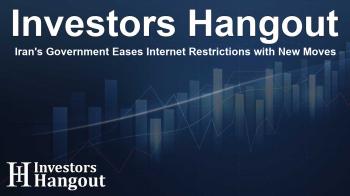Iran's Government Eases Internet Restrictions with New Moves

Iran Makes Strides Towards Internet Freedom
Iran's reformist government has recently lifted restrictions on Meta Platforms, Inc.'s WhatsApp and Alphabet Inc.'s Google Play, marking a pivotal moment towards increased internet openness. This change comes as part of a broader initiative by the government, demonstrating a commitment to enhancing civil liberties and access to information.
Significant Political Change
The decision, led by Masoud Pezeshkian, reflects a significant shift in policy, overcoming challenges posed by more traditional hardline factions within the government. The ban's lifting signifies the administration's recognition of the pressures on civil society and a desire for positive change.
Public Reaction and Expectations
As stated by Sattar Hashemi, Iran's telecommunications minister, the move is viewed as an initial step toward reducing internet restrictions. He emphasized, “This path will continue,” indicating a promise for ongoing improvements. The minister's comments have resonated with many citizens hopeful for a more connected society.
The Context of Internet Usage in Iran
Despite previous restrictions, platforms like WhatsApp and Instagram have seen increasing usage in Iran. Many citizens previously circumvented these bans through widely accessible VPNs, leading to discussions about the irony of hardliners profiting from the sale of such tools while simultaneously restricting access to these platforms. The reformist camp argues that less restrictive measures could help alleviate public grievances.
Social Media Platforms' Popularity
Data from the Iranian Students Polling Agency illustrates a growing dependence on WhatsApp among Iranians, with usage jumping to 71.4% by mid-2021, largely due to previous bans on other messaging services. Instagram has also climbed in popularity significantly, underlining a trend towards social media reliance even in the face of regulatory challenges.
Challenges Ahead
While this policy change is a positive sign, it faces significant opposition from hardliners who perceive the internet as a tool for foreign adversaries, citing concerns over national security. These factions view the easing of restrictions as a potential vulnerability in Iran's resistance against perceived external threats.
International Relations Context
The decision to lift bans comes at a time of heightened tensions internationally, particularly with the United States. Recent accusations made by the U.S. regarding alleged plots have led to firmer rhetoric from Iranian officials defending their sovereignty and national interests. Iran's foreign ministry has dismissed these claims, seeking to portray a united front domestically and internationally amidst ongoing scrutiny.
Implications for Future Governance
This move towards a more open internet underlines the government's strategy to foster a more connected society while navigating the complexities of domestic opposition. The outcome of this policy shift could have broad implications for civil liberties in Iran, enabling greater freedom of communication and expression.
Continued Monitoring of Developments
The ongoing developments in Iran will be crucial for future governance and societal change. Both domestic and international audiences will be keenly watching how the government balances the need for control with the demands for freedom and transparency.
Frequently Asked Questions
Why was the ban on WhatsApp and Google Play lifted?
The ban was lifted as part of the Iranian government's initiative to reduce internet restrictions and promote civil freedoms.
What prompted the Iranian government to take this step?
The decision reflects the government's recognition of public pressures and the desire to improve civil society conditions.
How has social media usage changed in Iran over the years?
Social media usage in Iran has grown significantly, with increasing numbers of citizens turning to platforms like WhatsApp and Instagram despite previous restrictions.
What are the main concerns of hardliners regarding internet freedom?
Hardliners view the internet as a potential tool for foreign interference, raising concerns about national security and control over information.
What could this change mean for Iran's future governance?
This change may indicate a shift towards more connected governance and could enhance freedom of expression, impacting the political landscape in Iran.
About Investors Hangout
Investors Hangout is a leading online stock forum for financial discussion and learning, offering a wide range of free tools and resources. It draws in traders of all levels, who exchange market knowledge, investigate trading tactics, and keep an eye on industry developments in real time. Featuring financial articles, stock message boards, quotes, charts, company profiles, and live news updates. Through cooperative learning and a wealth of informational resources, it helps users from novices creating their first portfolios to experts honing their techniques. Join Investors Hangout today: https://investorshangout.com/
Disclaimer: The content of this article is solely for general informational purposes only; it does not represent legal, financial, or investment advice. Investors Hangout does not offer financial advice; the author is not a licensed financial advisor. Consult a qualified advisor before making any financial or investment decisions based on this article. The author's interpretation of publicly available data shapes the opinions presented here; as a result, they should not be taken as advice to purchase, sell, or hold any securities mentioned or any other investments. The author does not guarantee the accuracy, completeness, or timeliness of any material, providing it "as is." Information and market conditions may change; past performance is not indicative of future outcomes. If any of the material offered here is inaccurate, please contact us for corrections.
